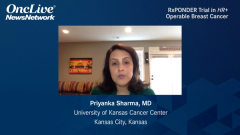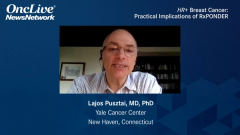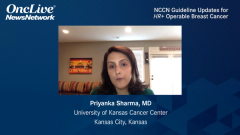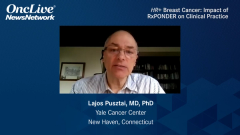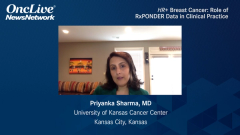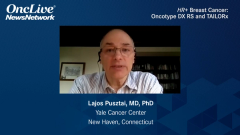
HR+ Breast Cancer: Role of RxPONDER Data in Clinical Practice
Lajos Pusztai, MD, PhD, and Priyanka Sharma, MD, share closing thoughts on additional data they hope to see from the RxPONDER trial, and using these data in clinical practice for the treatment of HR+ early breast cancer.
Episodes in this series

Lajos Pusztai, MD, PhD: I’m very pleased with the RxPONDER results. We were proud of the accomplishments made by SWOG, the cooperative groups, our colleagues, and patients who participated in this study. This is really a practice-changing study. It settles an important question regarding the value of chemotherapy in younger and older woman with stage II breast cancer, 1 to 3 positive nodes. I think the study is changing practice in an important way and will enable thousands of women to avoid chemotherapy safely. Also, it helps patients who are younger feel more comfortable with chemotherapy, because they know that this could potentially save their life.
I should mention that these results are the first preliminary results from RxPONDER. We have about 60% of the planned events, but even with 60% of planned events, we have a statistically valid and solid finding. Of course, the final major results of RxPONDER will be published as well, once all the events have been accrued. Currently, about 60% of all events that were expected from the trial have occurred. We also plan to do some important correlative science studies, particularly to get more precise answers to the question of, what’s the contribution of the chemotherapy-induced ovarian suppression versus the chemotherapy-related cytotoxicity to the benefit that is observed?
Priyanka Sharma, MD: What additional questions do the results of SWOG-1007 pose to us for our patients in the clinic?
We touched upon a couple of them. The first being in postmenopausal women, can we now take a step further and look at strategies to avoid chemotherapy in patients who have more than 3 positive nodes? I think that will be answered in some of the ongoing studies. That’s one of the questions. The second question that pertains to premenopausal women is what is the value of ovarian function suppression in this subgroup with a recurrence score less than 25 and 1 to 3 positive nodes? Will ovarian function suppression be an add-on to chemotherapy, or will it provide benefit equivalent to chemotherapy? I think that is a question that will have to be answered in a prospective trial.
Transcript Edited for Clarity


